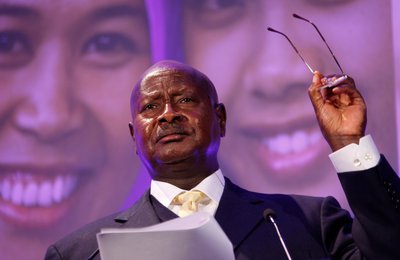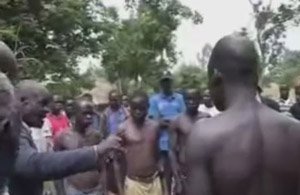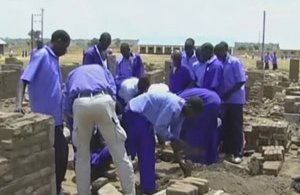
Q: Hon PM, How did you find yourself becoming one of the delegates representing the Lord’s Resistance Army (LRA) in the Juba Peace Talks?
"In early 2006, when news about the LRA peace talks had just begun, there was a civil society consultation here in Arua. Now, Arua is one of the districts affected by the LRA conflicts and they wanted to hear our views. As PM of Lugbwara chiefdom, I was invited to make a presentation.
"In that forum, I made very strong statements and a passionate appeal for peace talks. In West Nile we knew that Kony would be worried about what would happen to him, in case he decides to come back home, and so we needed confidence building. As an elder I knew the costs of war and the background to the conflict.
"So in my statement I gave assurance to Kony. I pleaded for peace and volunteered to give land to Kony for his resettlement in West Nile in case he fears returning to Acholiland. We were all speaking language of forgiveness, for Kony is our son. The children he abducted and those in the UPDF killing each other are our sons and daughters.
"So we wanted an end to the insurgency and for that, we as West Nilers could not leave our brothers in Acholi to suffer alone. We are historically brothers. I also called upon the ICC to drop its arrest warrant to facilitate peace talks and use the money meant for flying Kony and his commanders to The Hague to compensate the victims in IDP camps at the time.
"So, it happened that LRA representatives were in the meeting and when they briefed Joseph Kony about what the people in West Nile said, Kony said he wanted a representative from West Nile in the talks and so the delegates nominated me and Kony agreed.
"That’s how I became an LRA delegate to the talks."

Q: What was your immediate reaction when you received that phone call?
"You know, it was one of those very unusual phone calls that require a long pause after the word hello.
"It was 7.00pm and I was having dinner with my family and the phone rang. When I answered hello, the next question was; “are you able to speak?” I answered yes of course but the caller insisted, “are you alone?” I said, well, give me a minute and I move out of the house.
"'Okay, this is the LRA Delegation in Juba. My name is Martin Ojul. Also online, I have with me my colleagues and I think it was either Dr. Matsanga or Jame Obita and Chrispus Ayena who is Senior Counsel to LRA Leader Joseph Kony'. Mr. Ayena especially introduced himself.
"'Now, you have been nominated to join the LRA peace team in Juba, what say you?'
"After a long pause, I said 'yes, of course, I want to be part of any peace team.' What followed was a long conversation on confidentiality and security."

Q: How easy was it? And how did people react to the news?
"But we were talking about the LRA and Joseph Kony here.
"I knew a lot about this group and the conflict but I had no dealings or any connection with them before. I also knew they were wanted by the ICC. But, anyway I said yes. And there were a lot of backlashes.
"Immediately, the news broke out-over BBC and local radio stations announcing the composition of the LRA team, I started receiving phone calls. My friends and relatives and colleagues were all calling to confirm whether it was me and asking for how long I had been dealing with the LRA. My attempt to explain did not yield much.
"But it is understandable, because many of these people calling were genuinely worried for me and they kept asking, “are you sure you are safe?” Even security operatives were calling my friends to find out more about me. In fact a group of strange people; suspected security operatives visited my home and interviewed my mother and they were asking too many questions about my background and past dealings.
"That night I took a bus to Kampala and met with the then Minster for Internal Affairs, and leader of the Government Delegation to the Juba Peace Talks, Dr. Ruhakana Rugunda. He had already been briefed by the mediator Dr. Riek Machar but I still explained the circumstances surrounding my appointment and its aftermath.
"He asked me to be calm and assured me of full government protection. He said, it was good that a genuine person like me had been appointed to the team and that we should be frank and offer Kony unbiased opinions to facilitate the peace process. He asked me what help I needed. I told him, I don’t even have a passport. He said no problem, explained the needed requirement like photos and within forty five minutes I had a passport in my hands."

Q: So what happened next?
"Well, the joke in Juba was that after I left the Ministry of Internal Affairs there was a rumor that Joseph Kony himself had just met with the Minister and he was given a diplomatic passport in 10 mins. Of course that was a joke. After that, arrangement was made for me to join the LRA peace team in Juba. In Juba preparation was in high gear and there was a lot of excitement and determination to get a peace deal that would finally end the LRA insurgency."
Q: Let’s talk about the negotiation in Juba itself, how serious was it? Was there any realistic chance or people were taken for a ride?
"The LRA team was determined to get a good deal to end the insurgency. The mediator was serious about ending the conflict and the government team too, demonstrated every will to negotiate in good faith.
"But, let’s face it, this conflict has been around for over twenty years, and there was no way it could have been negotiated in a hurry. Time was not on our side. There was too much expectation but very little patience. Understandably people wanted a quick solution, but peacemaking cannot be rushed. "
Q: What is your last word to Ugandans and the LRA?
"Peace is the only way! Lets us make peace, we must talk. Museveni and Kony should understand that, history will change them equally. The two of them bear equal responsibility for what happened in northern Uganda and what is going on in DR Congo, CAR and South Sudan as an outcome of the continuation of this insurgency. We cannot sit and watch. We cannot afford to do nothing. We must negotiate an end this rebellion. Thank you very much."
Images provided by the National Memory and Peace Documentation Centre, Kitgum. An initiative of the Refugee Law Project and Kitgum District Local Government.












